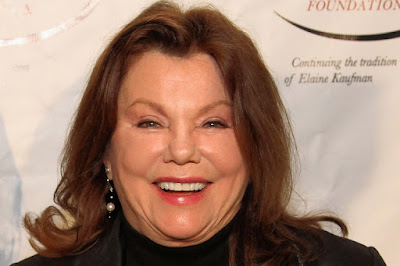By James V. Ruocco
Golden Globe winner Marsha Mason comes to Hartford this spring to headline and co-direct Hartford Stage's eagerly-awaited revival of Neil Simon's heartwarming memory play "Lost in Yonkers," which made its Broadway debut back in February, 1991 and ran for 780 performances and 11 previews. Produced by Emanuel Azenberg and directed by Gene Saks, the cast included Irene Worth as Grandma Kurnitz, Mercedes Ruehl as Bella, Kevin Spacey as Louie, Jamie Marsh as Jay, Danny Gerard as Arty, Lauren Klein as Gert and Mark Blum as Eddie.
Mason's casting and subsequent directorial participation (a role she will share with Rachel Alderman) is no fluke.
Who better than Mason to helm and star in a Neil Simon production?
She was married to the playwright for 10 years.
She received three of her four Academy Award nominations for works written by the late playwright and screenwriter - "The Goodbye Girl," "Chapter Two," "Only When I Laugh."
On Broadway, she appeared in Simon's "The Good Doctor."
In London's West End, she starred in "The Prisoner of Second Avenue" opposite Richard Dreyfuss who won an Oscar for his performance in Simon's 1977 romantic film comedy "The Goodbye Girl" opposite Mason.
She also was featured in 1983's "Max Dugan Returns," which was written for the screen by Simon and on record, in the Grammy-nominated L.A. Theatre Works' recording of "The Prisoner of Second Avenue."
"I wanted to do this play because I love the character of the grandmother and I think it's a wonderful challenge for me," says Mason. "I think it's obviously one of Neil's best plays"
And yes, she is thrilled to be co-directing directing this revival with Alderman for Hartford Stage. It's a task she is especially proud of. Not to mention the fact that "Lost in Yonkers" won Simon the Pulitzer Prize for Drama in 1991 along with the Tony Award for Best Play.
"I would really like to steward it in a proper and wonderful way because I think that sometimes people think of him (Neil) as a joke master rather than a really good playwright. This play, I think, proves that he had much more to give as a writer than what a lot of people have just sort of expected of him."
Set in Yonkers, 1942, "Lost in Yonkers" tells the story of two brothers - Jay and Arty - who, after their mother has died of cancer are left in the temporary care of their strict, domineering grandmother for a short period of time ("Don't worry so much about your grandma. Your grandma knows how to take care of herself, believe me..."she tells them. "Go on outside, both of you. You talk too much") while their father is off on a so-called business venture to earn some "fast cash" to pay off his debts to a couple of gangsters.
It's a difficult adjustment of sorts (that's one of the key points of the piece) as the boy's grandmother is set in her ways, filled with anger and resentment and completely incapable to building a solid relationship with both her grown children and her unruly grandchildren.
"What I love about the play is that it's about an immigrant family," Mason explains. "It's about a Jewish immigrant family. It's also set at the beginning of World War II so there's a lot of basic human frailty, difficulty and conflicts that show how immigrant families think and how they react to things. In the time that we live now, I think it's really helpful to be reminded that America was really built on the immigrant family."
That's not all.
"The characters are so colorful and wonderfully idiosyncratic and complex. There's also this wonderful joy in the personalities of these two boys that I just think is really heartfelt."
"It's all about resiliency and how this family uses their strengths to survive whether its through comedy, through grit or through imagination" explains co-director Rachel Alderman. "There are so many different tools that this family uses to get by and to get through."
Family dynamics - you can't live or survive without them - are the heart and soul of "Lost in Yonkers."
"I recognize these people. I know these people," adds Alderman." .
"I shared with Marsha a picture of my great uncle at his candy store in Brooklyn. This is their world. That's where my father learned how to make ice cream shakes and stole probably some ice cream just like Arty and Jay do in the story. Here, this comedy comes from a place of need, of yearning and connection and also the feeling 'That I will survive.' "



No comments:
Post a Comment